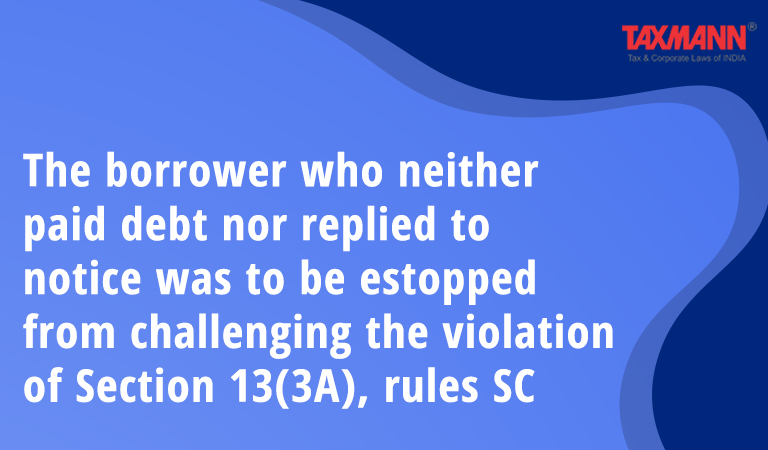The borrower who neither paid debt nor replied to notice was to be estopped from challenging the violation of Section 13(3A), rules SC
- Blog|News|FEMA & Banking|
- 3 Min Read
- By Taxmann
- |
- Last Updated on 18 July, 2024

Case Details: Arce Polymers (P.) Ltd. v. Alpine Pharmaceuticals (P.) Ltd. - [2021] 133 taxmann.com 42 (SC)
Judiciary and Counsel Details
-
- Sanjiv Khanna, L. Nageswara Rao and B.R. Gavai, JJ.
Facts of the Case
In the instant case, the borrower was sanctioned a working capital limit and term loan by Bank. Under terms of the loan, subject Property was mortgaged by Borrower with Bank. The borrower failed to repay the loan as per payment schedule as a result of which, loans were declared as a Non-Performing Asset.
Hence, Bank issued notice to the Borrower under Section 13(2) of the SARFAESI Act calling upon the Borrower to discharge its liability within sixty days failing which Bank would be entitled to exercise all or any of its rights under sub-section (4) to Section 13 of the SARFAESI Act.
Borrower neither made any payment nor responded by way of a reply within sixty days of notice under Section 13(2) of the SARFAESI Act.
Borrower wrote repeated request letters for restructuring of loans, which prayers were considered by Bank by giving indulgence, time, and opportunities. Bank actively considered Borrower’s request for extension of the moratorium period.
When Bank proceeded with auctions under SARFAESI Act, Borrower kept silent. As earlier auctions failed, Bank issued a notice informing Borrower about the auction to be held at a reduced reserve price. Borrower challenged actions taken by Bank after Subject Property had changed hands and third-party interests had been created.
Placing reliance on ITC Limited v. Blue Coast Hotels Limited and Others (2018) 15 SCC 99, the High Court held that compliance with Section13(3A) was mandatory and failure on the part of the Bank to respond to the representation of the borrower would vitiate the recovery proceedings. The High Court further observed that the stipulation of sixty days within which the response was demanded by the Bank was not prescribed in the provision.
The High Court held that compliance with Section 13(3A) was mandatory and failure on the part of the Bank to respond to the representation of the borrower would vitiate the recovery proceedings. The High Court further observed that the stipulation of sixty days within which the response was demanded by the Bank was not prescribed in the provision.
Relying on the decision of the Authorised Officer, Indian Overseas Bank and Another v. Ashok Saw Mill (2009) 8 SCC 366, it was held that when the Borrower challenges the measure in Section 13(4), it is open for them to also challenge the steps taken by the Bank under Section 13(2) of the Act from the date of action till the sale confirmation under Section 17 as a part of the same cause of action. Therefore, the Court held that the challenge was not barred by limitation.
The High Court also noted that the machinery and the building should have been auctioned separately by the Bank.
Supreme Court Held
On appeal, the Supreme Court observed that the entire fact of the case perspicuously reflects disingenuous conduct on part of Borrower to gain the indulgence, unfulfilled assurances, and promises and their unwillingness to pay. It was viewed that Borrower had waived and was estopped from challenging the violation of section 13(3A) of the SARFAESI Act.
The Supreme Court took note of the fact that the ITC Ltd. judgment referred to by High Court to establish violation of Section 13(3A) of the SARFAESI Act had on the facts of the case distinguished the principle to state that the creditor having given sufficient opportunity to the debtor to pay, the debtor is not entitled to the discretionary relief under Article 226 of the Constitution, which is an equitable relief.
Disclaimer: The content/information published on the website is only for general information of the user and shall not be construed as legal advice. While the Taxmann has exercised reasonable efforts to ensure the veracity of information/content published, Taxmann shall be under no liability in any manner whatsoever for incorrect information, if any.

Taxmann Publications has a dedicated in-house Research & Editorial Team. This team consists of a team of Chartered Accountants, Company Secretaries, and Lawyers. This team works under the guidance and supervision of editor-in-chief Mr Rakesh Bhargava.
The Research and Editorial Team is responsible for developing reliable and accurate content for the readers. The team follows the six-sigma approach to achieve the benchmark of zero error in its publications and research platforms. The team ensures that the following publication guidelines are thoroughly followed while developing the content:
- The statutory material is obtained only from the authorized and reliable sources
- All the latest developments in the judicial and legislative fields are covered
- Prepare the analytical write-ups on current, controversial, and important issues to help the readers to understand the concept and its implications
- Every content published by Taxmann is complete, accurate and lucid
- All evidence-based statements are supported with proper reference to Section, Circular No., Notification No. or citations
- The golden rules of grammar, style and consistency are thoroughly followed
- Font and size that’s easy to read and remain consistent across all imprint and digital publications are applied



 CA | CS | CMA
CA | CS | CMA
